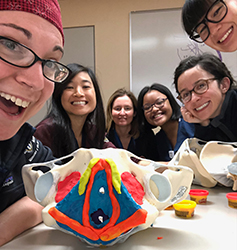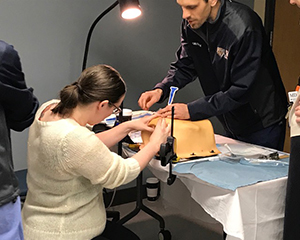Curriculum

As residents traverse each of the four years of training in our Ob/Gyn program, they progressively develop clinical skills and judgement and assume increasingly greater responsibility for patient management.
A strength of our training program is continual assessment of resident experiences through quarterly Resident Assemblies and annual evaluation. We use this feedback to help modify, expand and improve our curriculum each year.
The general rotation schedule overview below demonstrates the average time spent on each rotation through the course of the year of training. A unique feature of our rotation schedule is the 2-week blocks of some rotations like OB, Night Float and Ambulatory spread out throughout the year. Many of our surgical rotations are 4-6 weeks in a row to promote continuity with surgical faculty.
All of our rotations are based out of Strong Memorial Hospital (SMH) or Highland Hospital (HH) – located one mile apart – and their associated outpatient clinics.
I wanted a program where I would get great, well rounded training.
Sample Schedules
PGY-1
- Orientation – 2 weeks
- SMH Ob Birth Center – 6 weeks
- SMH Gyn – 6 weeks
- Ambulatory – 6 weeks
- Gyn Onc – 6 weeks
- SMH Night float – 6 weeks
- HH Night float – 2 weeks
- HH Gyn – 3 weeks
- Ultrasound – 3 weeks
- Vacation – 4 weeks
- Swing 1-2 weeks
PGY-2
- SMH L&D/triage – 6 weeks
- SMH Gyn – 6 weeks
- Ambulatory – 6 weeks
- Gyn Onc – 6 weeks
- HH Ob – 6 weeks
- SMH Night float – 6 weeks
- HH Night float – 2 weeks
- HH Gyn – 2-3 weeks
- REI – 4 weeks
- Vacation – 4 weeks
- Swing – 2 weeks

PGY-3
- SMH Ob L&D/Antepartum– 6 weeks
- SMH Gyn – 6 weeks
- Ambulatory – 6 weeks
- Gyn Onc – 6 weeks
- SMH Night float – 6 weeks
- HH Night float – 3 weeks
- HH Gyn – 3 weeks
- Urogyn – 4 weeks
- Elective – 4 weeks
- Vacation – 4 weeks
PGY-4
- SMH Ob L&D/Antepartum– 6 weeks
- SMH Gyn – 6 weeks
- Ambulatory – 6 weeks
- Gyn Onc – 6 weeks
- SMH Night float – 6 weeks
- HH Night float – 3 weeks
- HH Gyn – 6 weeks
- Elective – 4 weeks
- Vacation – 4 weeks
- Swing – 1 week
PGY-1
The major focus on the first year of residency is management of routine gynecologic and obstetric care. In the outpatient setting, this includes family planning, contraception and management of normal prenatal care. In the hospital, R1s manage normal labor and delivery, begin to evaluate early pregnancy and gynecologic patients presenting to the Emergency Department, and they develop basic surgical techniques like suturing and knot tying. R1s begin with basic GYN surgical procedures like simple laparoscopy, dilation & curettage and hysteroscopy. R1s also spend time in ultrasound to gain hands-on experience with obtaining ultrasound images.
PGY-2
The second year of residency focuses on exposure to more complicated obstetric and gynecologic care in the outpatient setting including chronic pelvic pain, infertility and high-risk obstetrics. In the hospital, R2s evaluate and manage patients in the Obstetric Emergency Department and they gain confidence in the treatment of postoperative complications in GYN ONC patients. R2s will become comfortable with more involved surgical techniques including operative laparoscopy. They gain more complicated cesarean delivery experience. R2s also develop leadership and team management skills as they teach interns and off-service residents on one of our Labor & Delivery units.
PGY-3
Our third-year residents manage the inpatient antepartum service with high-risk obstetric patients. They are also responsible for the delivery of these patients. Third year residents are focused on more advanced surgical procedures including classical cesarean section, laparoscopic hysterectomy and robotic approach to cases including surgery in GYN oncology patients. The R3s gain experience with the outpatient management of pelvic floor disorders. They also begin to supervise junior residents for GYN consultations from the Emergency Department and other inpatient services.
PGY-4
The fourth-year residents gain a global overview of the entire clinical service. They learn about team management with assignment of cases, team education and solving logistical challenges presented to their team. R4s are exposed to advanced surgical procedures. They develop surgical teaching skills while working alongside junior residents in the OR. At the completion of residency, we anticipate that our residents will have gained sufficient knowledge and technical skill in both outpatient and inpatient management of pregnancy and its associated complications as well as gynecologic problems. Our residents will be competent in the decision for and performance of gynecologic surgery in addition to the provision of appropriate post-operative care. They are expected to be able to function independently as generalist Ob/Gyns.
What our residents say...
"Rochester is an amazing place to live and work. There are so many cultural opportunities, delicious restaurants, and wonderful people."